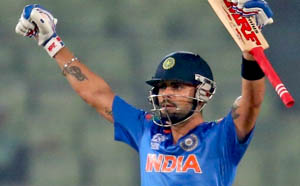Dhaka, Mar 29: India qualified for the semi-finals of the ICC World T20 2014 with an eight-wicket win over Bangladesh at Dhaka on March 28. Half-centuries from Rohit Sharma and Virat Kohli breezed India to the victory in 18.3 overs. MS Dhoni smashed the winning runs with a trademark six down the ground. India were chasing a 139-run target in the Group 2 Super 10 match in the T20 World Cup.
 MS Dhoni‘s men needed only a win to qualify for the semi-finals of the T20 World Cup after West Indies had beaten Australia earlier in the day. India were hardly troubled in their run-chase by a below-average Bangladesh side.
MS Dhoni‘s men needed only a win to qualify for the semi-finals of the T20 World Cup after West Indies had beaten Australia earlier in the day. India were hardly troubled in their run-chase by a below-average Bangladesh side.
The first two overs of India’s run-chase only yielded three runs each. The first delivery of the third over was a short delivery from Al-Amin Hossain. Rohit pulled it away for a six over deep square-leg. There was hardly any power behind the shot, still it sailed way into the stands. Dhawan was then bowled by Al-Amin. He came down the track and inside-edged a full delivery onto the stumps in the third over.
Al-Amin bowled a full and wide delivery and Kohli played a brilliant lofted cover-drive and got a six in the fifth over. He actually went down on one knee and got underneath the delivery. Al-Amin was then called harshly for a front-foot no-ball. Rohit hit the free-hit high in the air and was caught at mid-on.
Rohit came down the track to Shakib Al Hasan and hit one over wide mid-on for a four. Next ball, he came forward again and drove one on the up towards deep cover and got consecutive fours. Mashrafe Mortaza came into the attack in the seventh over. He bowled a straight back of a length delivery and Rohit guided it wide of the short third-man fielder and got another four.
In the ninth over, Bangladesh missed a glorious chance to dismiss Rohit. He hit one high in the air off Ziaur Rahman. Two fielders converged at deep mid-wicket and the catch was dropped. Rohit then pulled a short delivery in the air for a four towards deep mid-wicket.
Mushfiqur Rahim threw the ball to Sohag Gazi to bowl his off-spin in the 10th over. Kohli came down the track and whipped one through mid-wicket for a four. Sohag then offered width and Kohli went back and punched the ball wide of the cover fielder and got another four. Kohli got into the 40s with a four towards third-man. Ziaur bowled one outside off-stump and Kohli opened the face of the bat to guide the delivery.
Kohli pulled one from Mahmudullah towards long-leg and got two runs. That was the 100 for India in the 14th over. Rohit then reached his seventh half-century on the last ball of the 14th over with a single. Rohit cut a short and wide delivery from Al-Amin for a four behind point for a four. Kohli soon got to his half-century with a single towards cover.
Bangladesh did get a breakthrough as Rohit flashed at a low full-toss from Mortaza. The ball was caught by Nasir Hossain at point. Rohit had to depart for 56 off 44 deliveries with five fours and one six. That also ended a 100-run partnership between Rohit and Kohli for the second wicket.
Dhoni walked out into bat. He hit a length delivery from Al-Amin high in the air towards long-off. The ball just bounced short of the boundary line and went for a four. He then pulled a wide delivery for a six over wide long-on. Dhoni then hit the wining runs with a six down the ground in the 19th over.
Virat Kohli (left) and Rohit Sharma each scored half-centuries for India. They shared a 100-run partnership for the second wicket © Getty Images
Earlier, India captain Dhoni had won the toss and elected to bowl first. India went in with an unchanged side that beat Pakistan and West Indies in the group. A win for India would see them qualify for the semi-finals. Bangladesh’s innings never saw any real momentum as they kept losing wickets at the wrong time.
They eventually posted a total of 138 for seven in their 20 overs. Anamul Haque top-scored with 44 and Mahmudullah was unbeaten on 33 for Bangladesh. Amit Mishra took three wickets and Ravichandran Ashwin took two. Both the spinners were at one time on a hat-trick. Neither could complete the milestone.
The total did not look enough to halt India and it proved true in the end. Although nine deliveries were remaining, it was far more easy for India. Ashwin was the Man of the Match for his two wickets for 15 runs.
Brief scores:
Bangladesh 138 for 7 in 20 overs (Anamul Haque 44, Mushfiqur Rahim 24, Mahmudullah 33*; Ravichandran Ashwin 2 for 15, Amit Mishra 3 for 26) lost to India 141 for 2 in 18.3 overs (Rohit Sharma 56, Virat Kohli 57*, MS Dhoni 22*) by 8 wickets.
Man of the Match: Ravichandran Ashwin





Comments
Add new comment